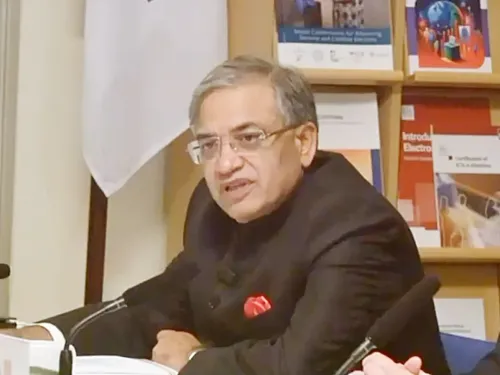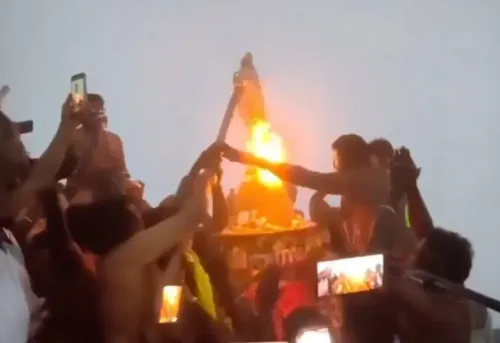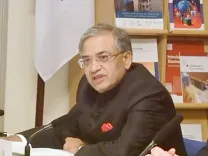How did Salim Pistol’s arrest impact the gangster-terror nexus in India?

Synopsis
Key Takeaways
- Salim Pistol's arrest is a substantial win for Indian security forces.
- He was a major supplier of arms to various gangster factions.
- His connections to terror networks pose a significant threat to national security.
- The arrest may uncover more details about the gangster-terror nexus.
- Advanced weaponry was supplied to gangs, complicating law enforcement efforts.
New Delhi, Aug 13 (NationPress) The apprehension of the infamous arms dealer Salim Pistol represents a significant victory for Indian security forces. Captured while in Nepal, he was swiftly transported to New Delhi through a collaborative effort involving the Delhi Police Special Cell, Indian Intelligence agencies, and Nepalese law enforcement.
The detention of Salim Pistol, whose real name is Sheikh Salim, is poised to inflict severe damage on the numerous gangster factions operating within the nation. He was a pivotal arms supplier to various criminal organizations in states such as Uttar Pradesh, Bihar, and Punjab.
This arrest is especially significant as the National Investigation Agency (NIA) is currently investigating a vast gangster-terror nexus that poses a substantial threat to internal security.
Pistol had connections to the ISI and operated under the directives of Dawood Ibrahim, as per intelligence reports. He procured weapons from Pakistan and smuggled them into India, subsequently distributing them to various gangster networks.
Investigations indicated that he was a principal arms supplier for the Lawrence Bishnoi gang and had significant dealings with Hashim Baba, a notorious gangster in Northeast Delhi. The police and intelligence agencies are set to conduct extensive interrogations to extract valuable information on multiple cases.
His connections extend to the murder of Punjabi rapper Sidhu Moosewala and the assassination of Baba Siddiqui, a politician from Maharashtra. Most critically, he is expected to provide crucial insights into the ongoing gangster-terror nexus investigation by the NIA.
This network has its masterminds based in Pakistan and Canada, orchestrating targeted killings and terror activities. Salim Pistol facilitated the provision of firearms to these gangsters.
During investigations, authorities uncovered that the gangsters employed advanced weaponry, including a Zigana, a Turkish-made pistol, supplied by Salim. He utilized drones to transport these weapons into India, where they would be disassembled and concealed in vehicle compartments for later reassembly. These pistols fetch between Rs 4 to Rs 6 lakh in India and are frequently smuggled across the Nepal border or dropped in Punjab via drones.
The Punjab police are also probing a cross-border arms smuggling operation linked to the ISI, having seized two Glock 9 pistols along with magazines and ammunition intended for delivery to Nav Pandora, a known associate of Jaggu Bhagwanpuria.
Intelligence agencies assert that all these gangs, including Salim Pistol's, are interconnected. Salim played a pivotal role in coordinating arms deliveries among these factions.
The weapons supplied by him were utilized in gang conflicts, targeted executions, and acts of terrorism, as the investigations reveal.
Furthermore, the gangster-terror nexus is intrinsically linked to the Khalistan movement, with operatives based in Canada and Pakistan driving it. Salim's interrogation is expected to unveil more details about his clientele both within India and internationally.
Originating from Jafrabad in Delhi, Salim left school after the eighth grade and initially worked as a driver. In 2020, he was involved in a car theft alongside his associate Mukesh, which led to his arrest and subsequent release on bail. Afterward, he engaged in minor criminal activities before pivoting to arms trafficking.










